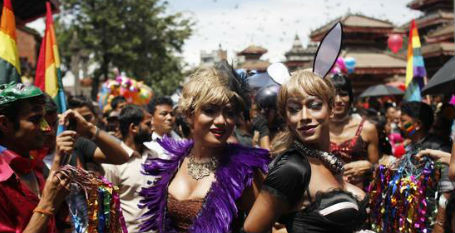The Gaijatra festival that this year fell on Aug. 11 is traditionally the only day people felt free to cross-dress in the socially conservative Hindu-majority nation and which the LGBT community has been using t to make it their Gay Pride Parade.
Thousands of people lined the narrow, cobblestoned streets of Katmandu’s old city to watch the LGBT community parading with rainbow-colored balloons and banners along 1-kilometer across the city’s central square, according to an AP report published in therepublic.com.
Some of those who took part in the parade wore the traditional dress of their ethnic communities but many others were painted in makeup and cross dressed.
This is vastly different from Nepal’s first Gay Pride in 2001 when most participants wore masks to prevent being identified by homophobic people.
Nonetheless, Nepal remains largely a conservative country where people disapprove of gay people and highly stress straight relations and the law ministry is currently preparing to enact anti-gay laws that will punish same-sex relations with three years imprisonment and prohibit same-sex unions.
Nepal is a fledgling democracy which was ruled for centuries by a Hindu religious monarchy and hereditary prime ministers with absolute powers. In the 1990s that monarchy was reduced to a constitutional figurehead and later in 2008 completely abolished to become a republic.
The country’s constitution is still a work in progress that many hope will be completed this year.
In 2007, the Supreme Court ruled in favor of regarding same sex marriage but the state has not yet done the needful to even fully protect the LGBT community from discrimination. Many LGBT members think that might happen with the promulgation of a new constitution.
“When we gather again next year, we hope we are able celebrate the new law,” Bipin Lamichane, who wants to marry the partner he has lived with for five years, said int the report.
But changing laws may be easier than changing minds in a country where the traditional arranged marriage is still the norm, and where up to a decade ago gay people were routinely jailed for relations that authorities called “unnatural.”
“Sometimes even if we get laws in writing there is a big problem of implementation,” Lamichane said.
Laxman Acharya, a Hindu priest, said he expected most Nepalese to be open to same-sex relations, given that the average age in Nepal is 21, and some 35 percent of the 27.5 million population is 14 or younger.
“It is not going to dent the culture or religion,” Acharya was quoted as saying in the report.

